Open source helpdesk is a type of ticket management software with an open source code, meaning it’s usually freely available for potential modification. It helps you offer customer support and handle user requests from different channels, allowing agents to manage everything from one place.
Now, while there are many great paid options for helpdesk solutions out there, open source systems are a great alternative.
Why?
Not only are these tools free to use, but also offer an impressive array of features that provide a simple way to boost your customer service game.
Interested?
Make sure to read on.
Let’s cut straight to the chase—
A list of the best open source helpdesk software
There’s a vast number of open source platforms out there. So, to save you time, we went ahead and chose the best ones based on their ratings and amount of features available.
Aside from being among the top-rated helpdesk open source software, all these providers offer comprehensive customer support features. Moreover, they can assist agents in managing visitor queries and are freely available for users who desire more customization and control.
We will delve into the key features, advantages, and potential downsides of each system, enabling you to choose the one that best suits your business needs.
Here are the best open source helpdesk software:
1. Tidio

Rating: 4.7/5 ⭐️ (1,750+ reviews)
Tidio is a customer service and helpdesk system designed to ticket triage, streamline support and engage clients through live chat, chatbots, and email marketing automation. While it’s not a fully open source solution, it does offer a lot of features for free.
This also includes a free ticketing system with an unlimited number of tickets. All in all, Tidio’s practical helpdesk tools will help you optimize your support processes and improve your team’s efficiency as a whole.
Main features:
- Free online ticketing system to easily manage customer requests
- Lyro AI Agent that automatically resolves common queries and closes tickets when appropriate
- Chatbots that allow auto-responder messages to common inquiries
- Multichannel capabilities including email, Messenger, and Instagram
- Routing of real-time messages and support requests to the best-suited agents
Pricing:
- 7-day free trial available
- Free version available
- Starter ($24.17/mo)
- Growth (starts at $49.17/mo)
- Plus (starts at $749/mo)
- Premium (starts at $2999/mo)
Read more: Check out our knowledge base and find out all about using Tidio’s ticketing system. Also, learn how this luxury beauty brand managed to increase sales using Tidio.
Improve customer service with a robust helpdesk system
2. osTicket
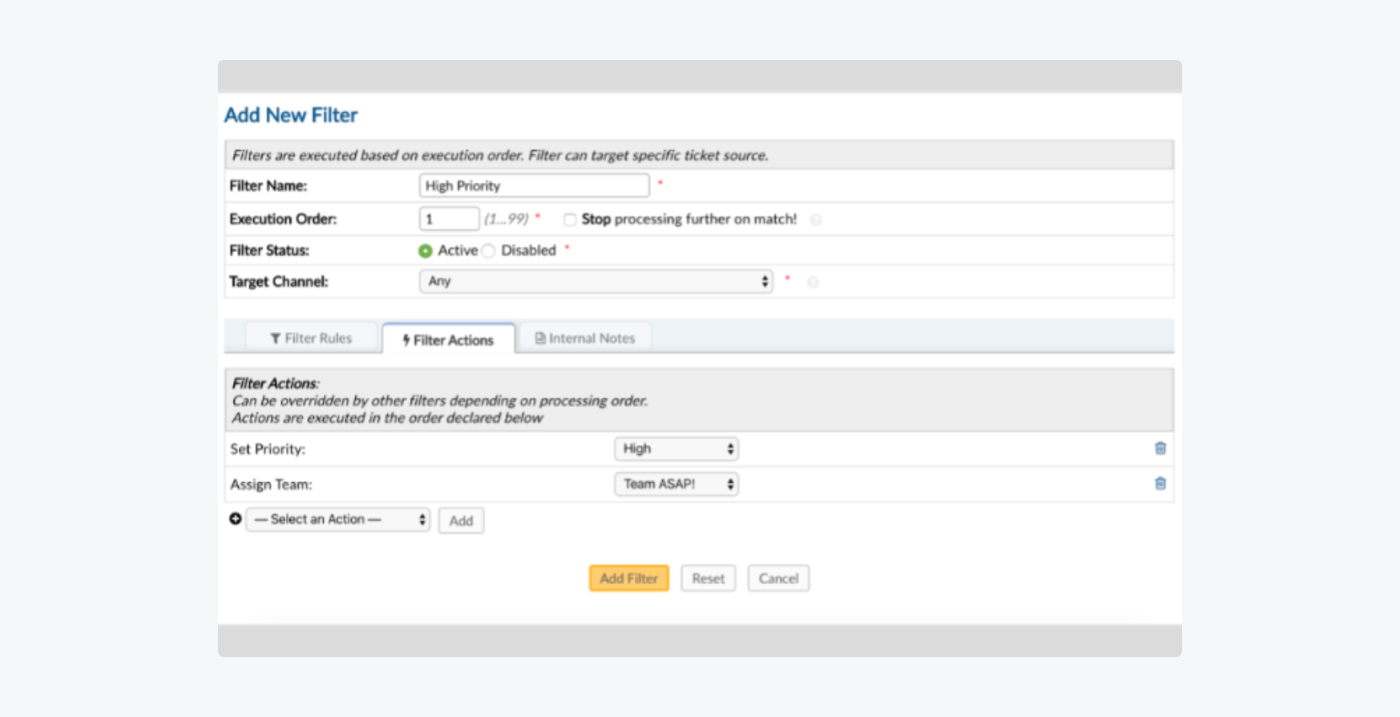
Rating: 4.4/5 ⭐️ (40+ reviews)
osTicket is another open source helpdesk ticketing system known for its simplicity and ease of use. It offers features such as support ticket system management, email integration, and knowledge base creation. With its intuitive interface and robust functionality, this free self-hosted support ticket system is a great option for businesses of all sizes.
Pros:
- Custom fields to summarize collected user data when submitting a ticket
- Ticket routing of notifications to the right departments
- Ticket locking mechanism to avoid agent collision
Cons:
- It can be difficult to find a specific ticket if you don’t know its number
- The UI has a bit of an outdated appearance
Pricing:
- Open Source (Free)
- Cloud-hosted (Starting at $12/mo/agent)
- Virtual Appliance: Contact sales
Read more: Find the best free CRM software for your business needs.
3. Heroic Inbox
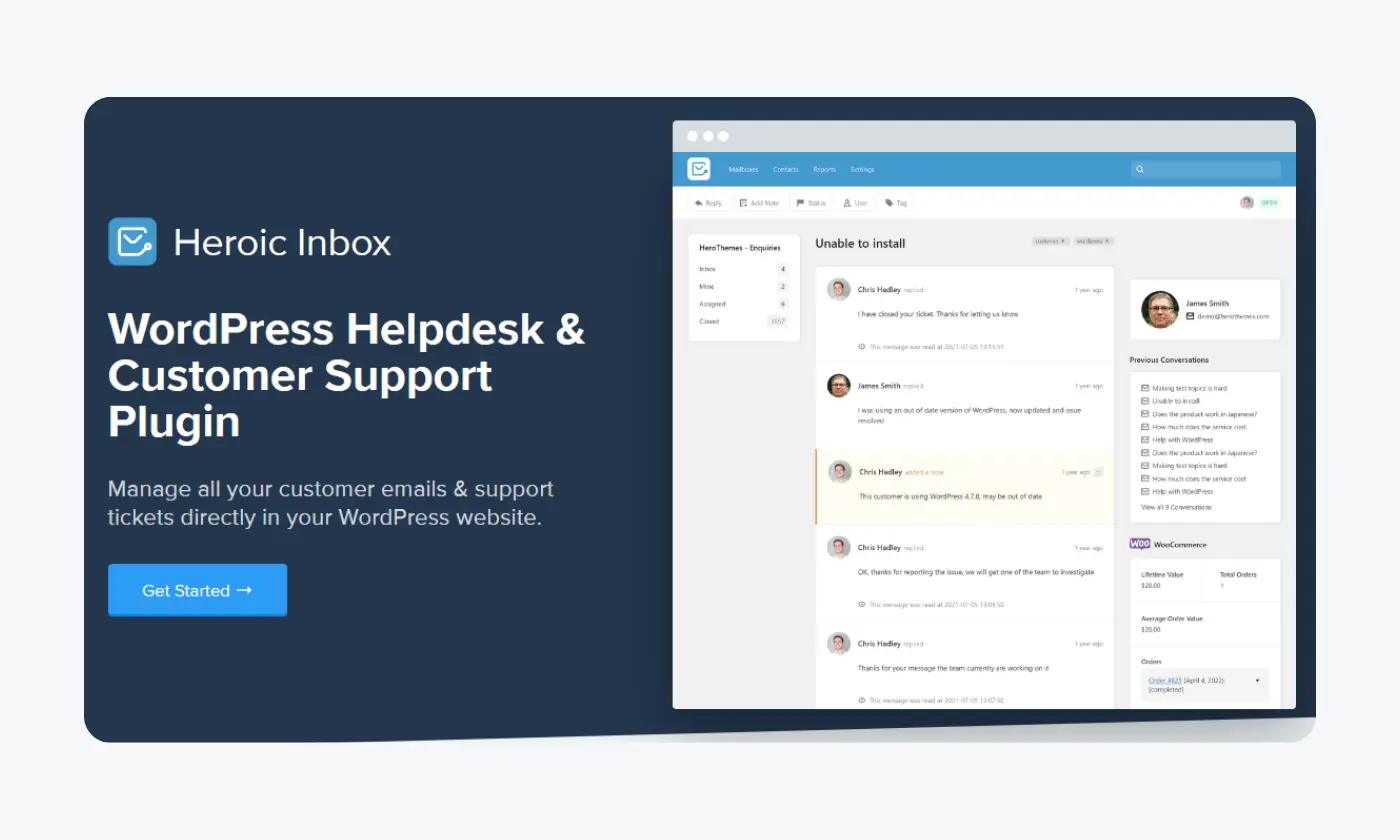
Rating: 4.8/5 ⭐️ (1,415+ reviews)
Heroic Inbox is a self-hosted help desk open-source ticketing plugin designed to streamline customer support with a shared inbox system. It is based on WordPress, a popular open-source content management system (CMS).
You can easily connect to Gmail, Outlook, and other email services to import your old conversations into Heroic Inbox and start collaborating with your team.
Pros:
- Powerful shared inboxes, right inside WordPress
- Unlimited users and tickets for every plan
- Collaboration features to add notes, draft replies, and assign users
Cons:
- No free plan available
Pricing:
- Heroic KB KB Essential ($169/year)
- KB KB Plus ($349/year)
- KB KB Pro ($599/year)
- Heroic Inbox Essential ($199/year)
- Heroic Inbox Plus ($499/year)
- Heroic Inbox Pro ($749/year)
4. Zammad
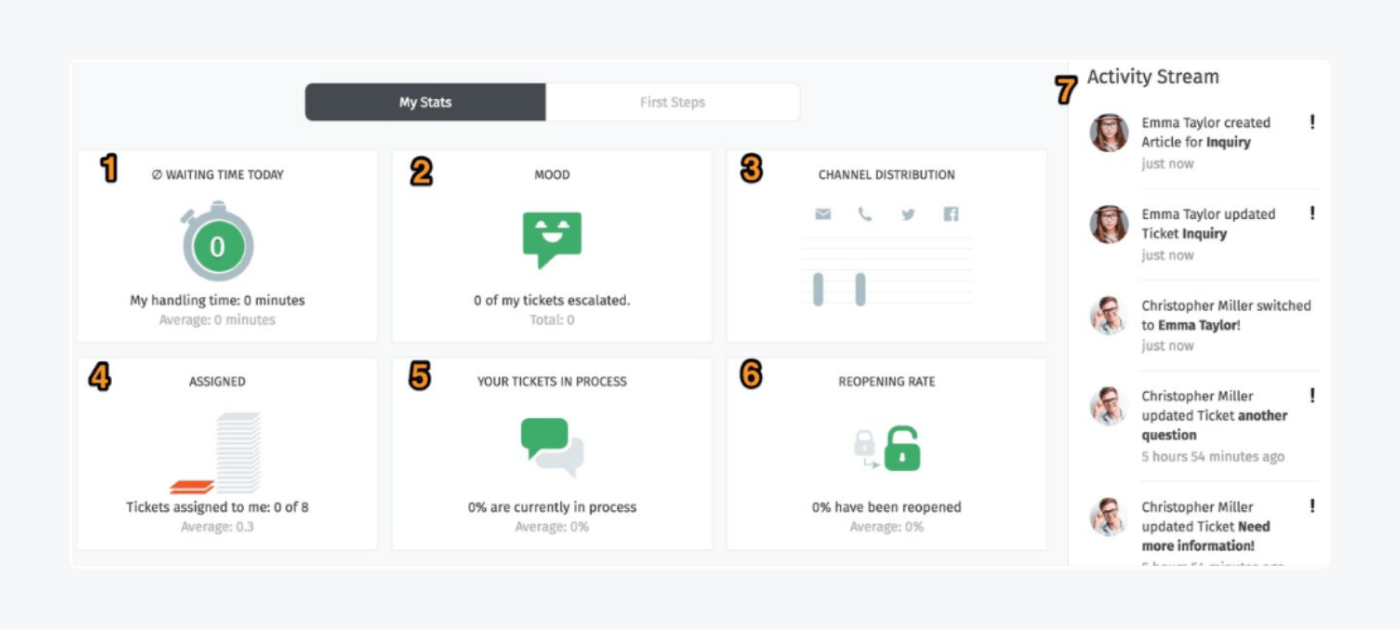
Rating: 4.5/5 ⭐️ (10 reviews)
Zammad is a modern and user-friendly helpdesk system built with Ruby language that offers a range of features to enhance customer support. It includes ticket management, knowledge base creation and templates, as well as live chat functionality. In addition, Zammad also offers integrations with popular communication channels such as email and social media, making it a versatile choice for businesses.
Pros:
- Customer interface that enables end-user to monitor the status of their ticket
- History of changes to track who modified which changes and when
- The ability to create individual lists and overviews for specific support teams
Cons:
- Some users want to see more integrations
- One user reported that the system was buggy and outdated
Pricing:
- Free trial available
- Starter ($7/mo/agent)
- Professional ($17/mo/agent)
- Plus ($26/mo/agent)
Read more: Check out the best ecommerce integrations available on the market.
5. FreeScout
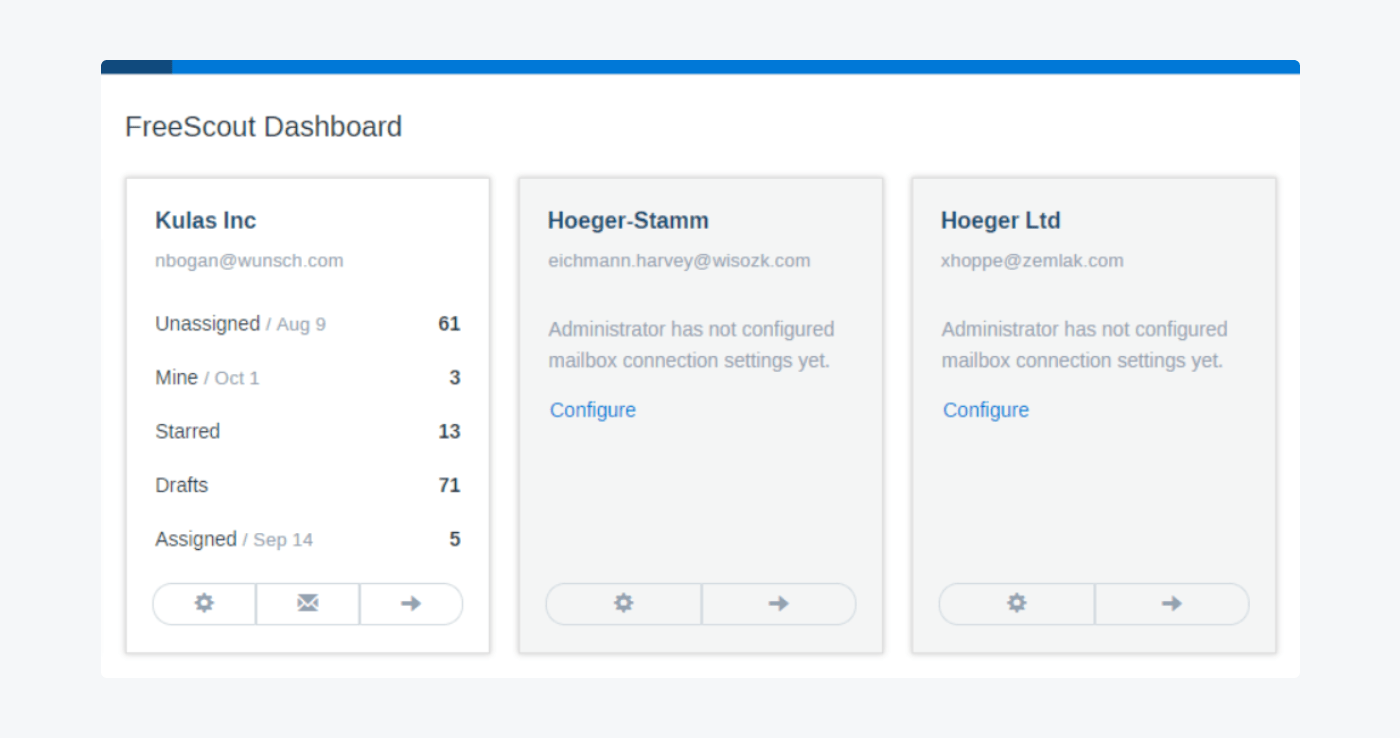
Rating: 4.2/5 ⭐️ (10+reviews)
FreeScout is a free-to-use, lightweight, and powerful open source help desk system. It’s MySQL and PHP-based (Laravel framework) with access to the GitHub repository. This is essentially a self-hosted clone of HelpScout and a popular Zendesk alternative. Users love it for its shared mailbox functionality, numerous modules, and seamless email integration. There’s also a free version of the mobile app available for Android and iOS.
Pros:
- Unlimited support agents, tickets, and mailboxes
- Collision detection when two agents open the same conversation
- Support of modern Microsoft Exchange authentication
Cons:
- Some features are missing, like a knowledge base or API
- Sometimes minor bugs appear
Pricing:
- Free to use
- Additional modules (Starting from $2.99/module)
Read more: Here’s all you need to know about the top HelpScout alternatives and competitors. And discover the top WordPress helpdesk systems for your business.
6. UVdesk
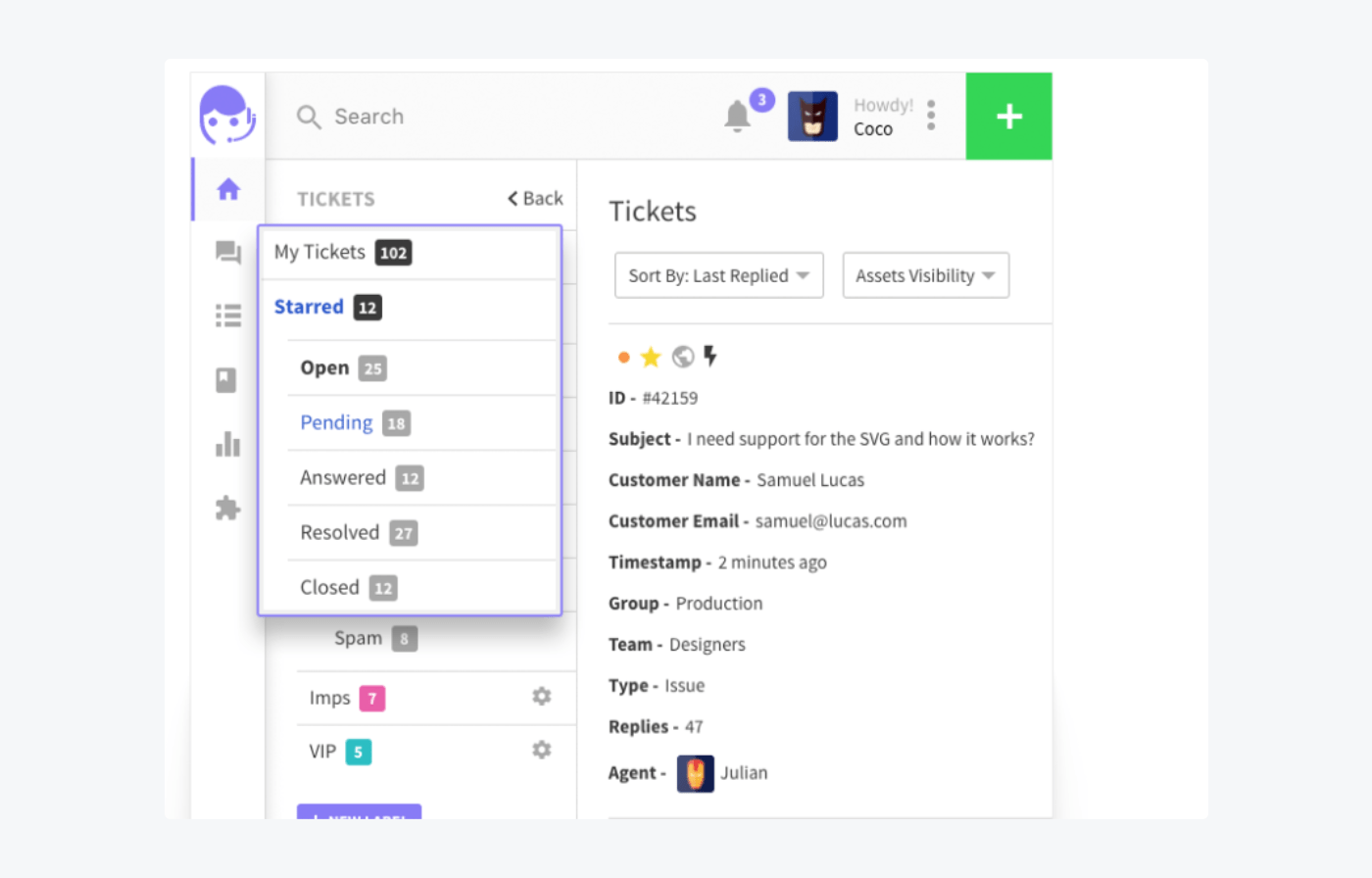
Rating: 4.3/5 ⭐️ (5+ reviews)
UVdesk is another free online helpdesk ticketing system built on the Symfony PHP framework. It offers a range of features including ticket and user management, email integration, and ecommerce tools and channels. This platform also provides multilingual support, making it a great choice for businesses with a global customer base. In addition, there’s a plugin version of UVdesk that you can connect to your WordPress-powered store for seamless integration.
Pros:
- Easy user management and custom workflows to respond faster
- Self-service knowledge base window to provide quick replies to FAQs
- Ticket assignment and condition-based workflow
Cons:
- Limited integrations
- UI is really basic
Pricing:
- Open source (Free forever)
- Pro ($22/mo/2 agents)
- Enterprise ($36/mo/2 agents)
Read more: Find out all you need to know about FAQ chatbots and learn how they can help automate your business processes.
7. Faveo
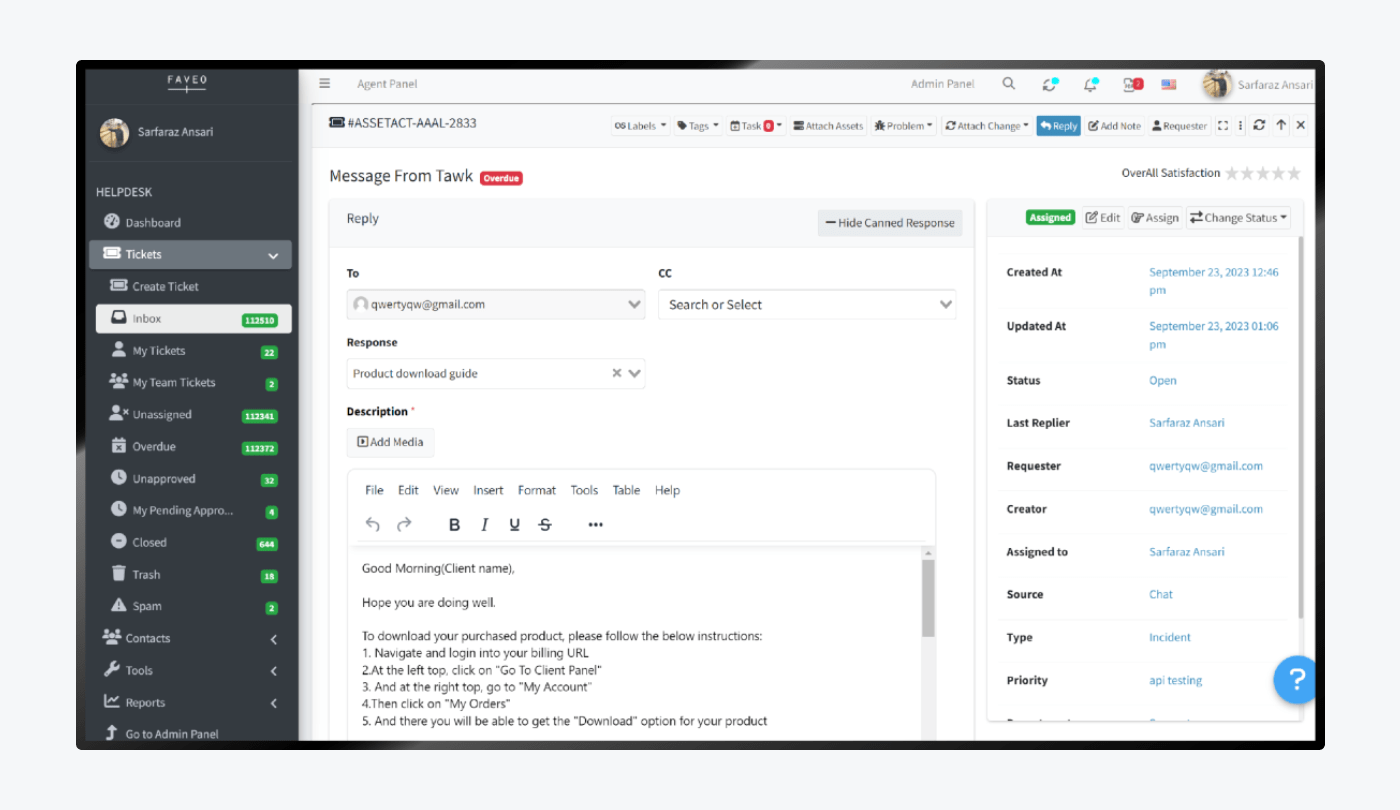
Rating: 4.6/5 ⭐️ (20+ reviews)
Simple but powerful, Faveo is another great helpdesk management system that will aid your team in staying on top of their customer support game. It comes with automation and SLA management features that help automate repetitive tasks and also allows you to seamlessly connect with all channels. There’s also a comprehensive knowledge base and FAQs, reducing the need for users to contact support.
Pros:
- Auto-reply, canned responses, and internal notes
- Ticket merging, assignment, and workflow
- Powerful reporting features
Cons:
- It can be a little slow while patching updates
- One user reported a few bulk functionalities being slow
Pricing:
- Help Desk Freelancer (Free/2 agents/mo)
- Help Desk Startup ($6.30/agent/mo)
- Help Desk SME ($13.50/agent/mo)
- Help Desk Enterprise: Contact sales
Read more: Learn the best practices for help desk you can implement in your customer support processes.
8. Hesk
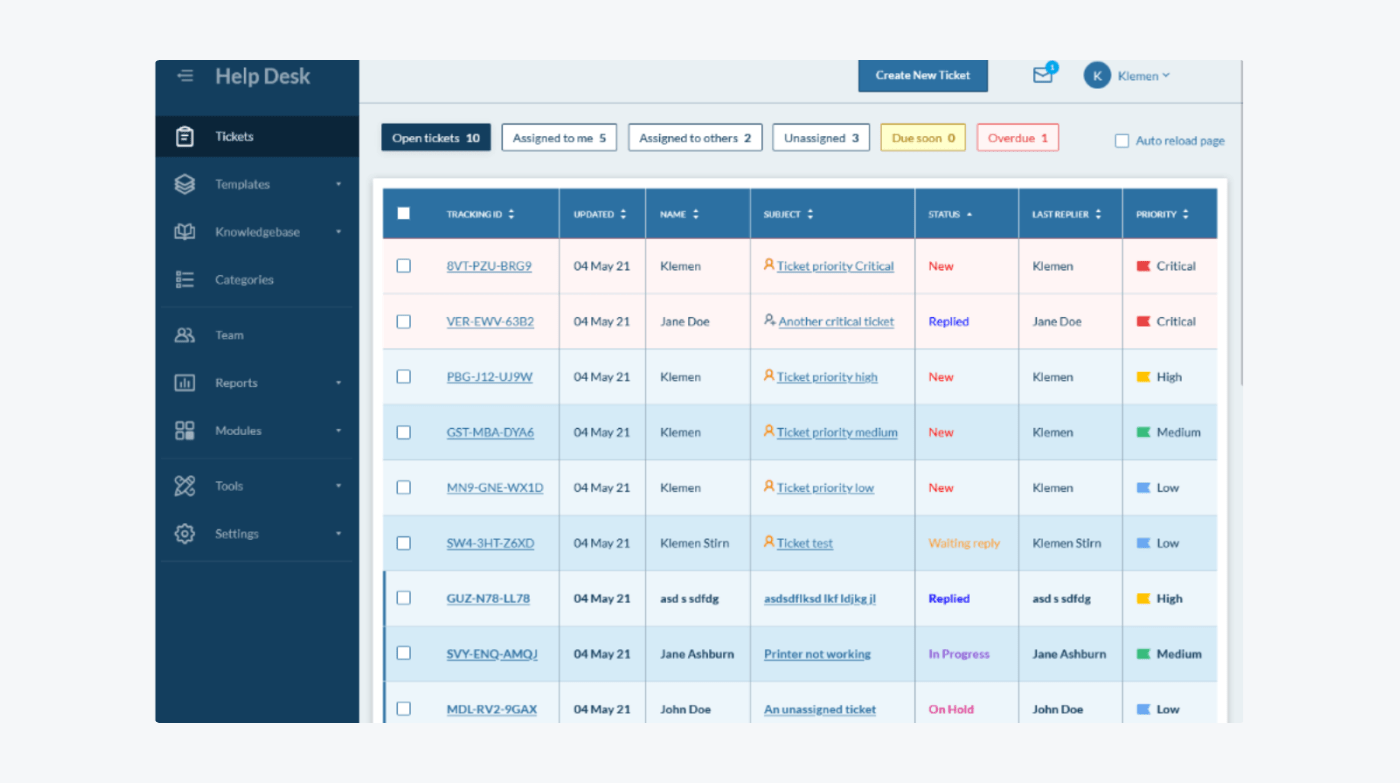
Rating: 4.7/5 ⭐️ (5+ reviews)
This is a cloud-based helpdesk and customer support software with an interface that’s easy to use. Aside from a centralized support system with ticket management, it also has knowledge base features. If you’d like, you can look into SysAid, a service desk partner of Hesk, and get access to features like live chat and advanced reporting and analytics.
Pros:
- The ability to prioritize and track ticket urgency and status
- Canned responses, ticket templates, and custom data fields
- Integrated knowledge base
Cons:
- UI for editing and updating knowledge base articles has an old-school design
- Some users think an archive system should be more intuitive
Pricing:
- Hesk Website License ($49.99, one-time fee only)
- Hesk Advanced License ($199.99, one-time fee only)
- SysAid Help Desk Solution Powered by Gen-AI (Hesk Partner): Contact sales
Read more: Learn the core differences between help desk vs. service desk.
9. Rocket.Chat
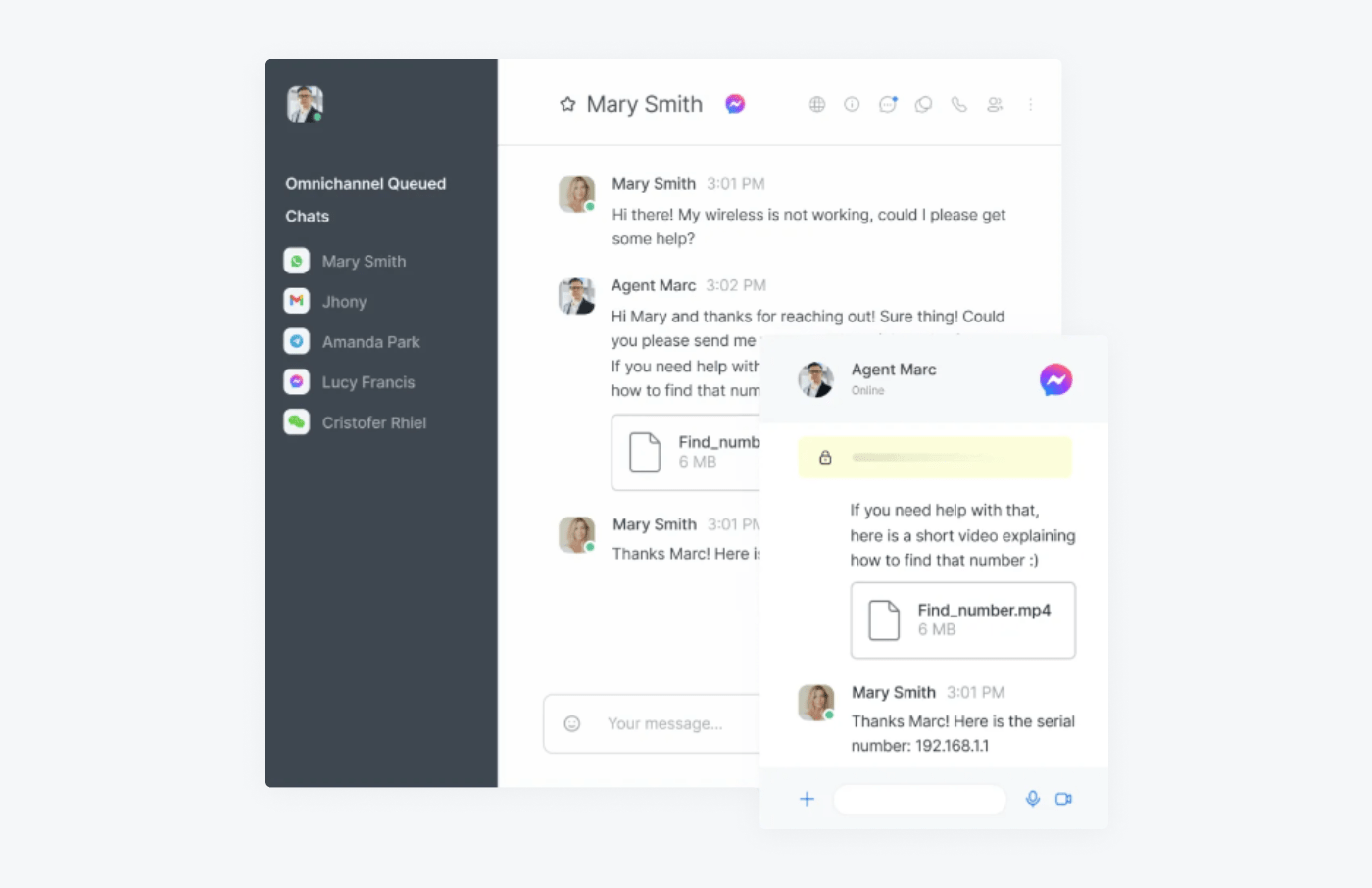
Rating: 4.2/5 ⭐️ (330+ reviews)
Rocket.Chat is a secure and versatile collaboration platform that allows you to interact with colleagues, other companies, customers, and communities. It comes with a ticketing system and omnichannel customer collaboration features, letting you respond to users no matter how they contact you. Moreover, you can easily connect Rocket.Chat with tools you already use, including WhatsApp Business, Zapier, Mod Assist, and more.
Pros:
- Analytics and real-time monitoring
- Live chat, email, and SMS messaging + more in paid plans
- Custom roles and permissions in the Enterprise plan
Cons:
- One user faced upgrading issues
- It can get a bit complex for non-technical users
Pricing:
- Starter (Free)
- Pro (€4/mo)
- Enterprise: Contact sales
Now that you reached the end of our list, it’s time to address another important question—
What are the benefits of using an open source ticket management system?
There’s no shortage of advantages that come with using the features of an open source help desk platform for your needs. Here are some of the most important ones:
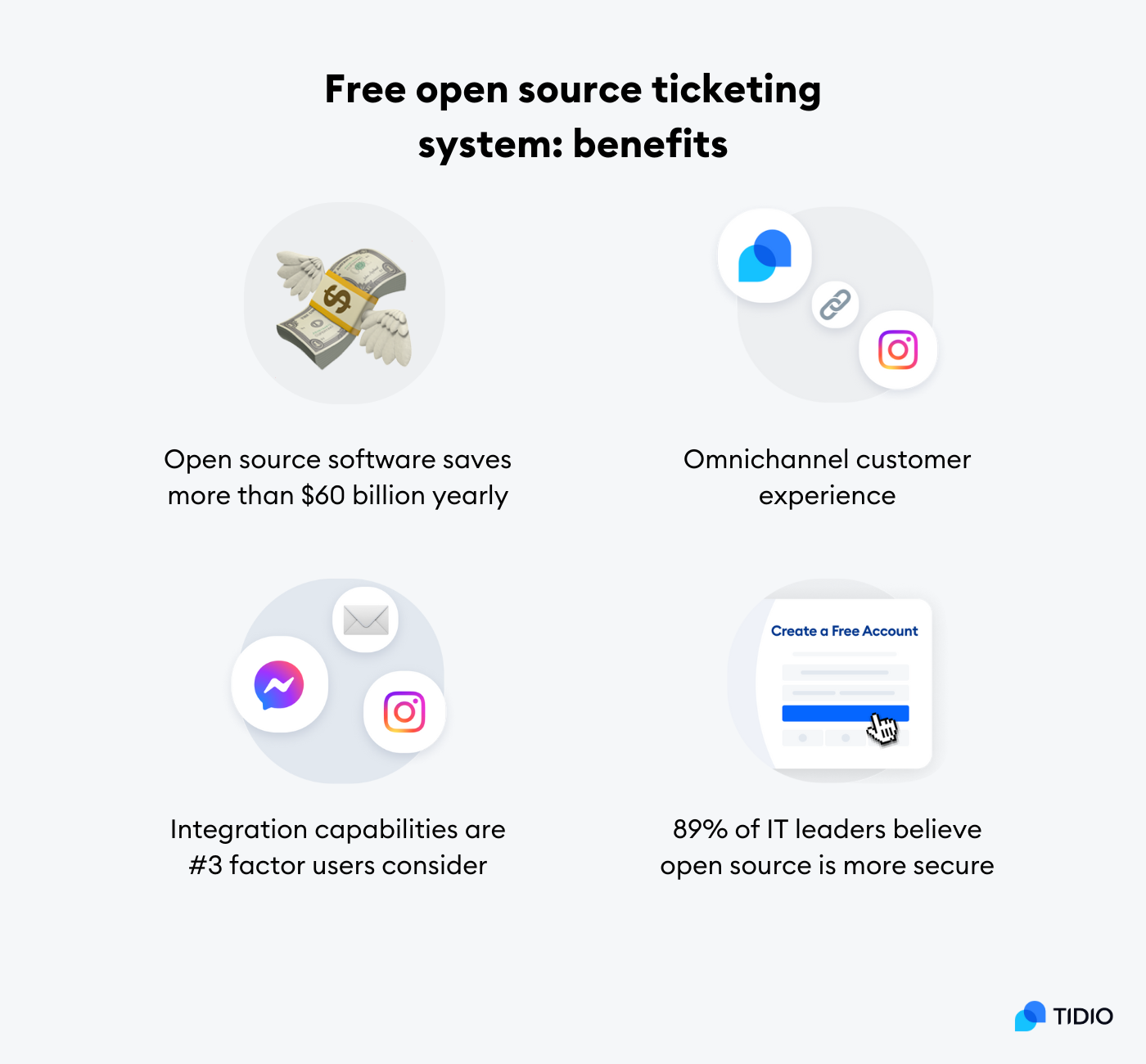
- Cost-Effectiveness: since open source software is typically free to use, businesses can significantly cut costs as compared to using proprietary systems. In fact, according to Zipdo, open source software saves businesses more than $60 billion every year.
- Omnichannel functionality: research indicates that the most commonly used communication channels include chatbots (44%), followed by Facebook (42%), WhatsApp (34%), and SMS (32%). Open source ticket management systems usually can be customized to fit the unique needs of each business, including omnichannel customer service experience.
- Integration capabilities: according to the latest global software buying trends, integration capabilities are a #3 factor users take into account when choosing the software for their needs. Most open source helpdesk systems are designed with this compatibility in mind and can be integrated seamlessly with other platforms. If your business requires more specialized integration or unique features, you may want to explore custom software development options to ensure your helpdesk solution meets all your needs.
- Security features: due to more scrutiny from the community, open source systems tend to be more secure and any safety loopholes are quickly found and fixed. In fact, as many as 89% of IT leaders believe open source is more secure than proprietary software. By using a secure system to handle customer inquiries, you keep your client’s data safe and boost customer loyalty in the long run.
Potential drawbacks of using an open source ticketing sytem
While open source helpdesk software offers cost savings and customization, there are still some limitations to consider:
- More technical setup and maintenance: many systems require manual installation, server configuration, and regular updates, often without dedicated support
- Limited out-of-the-box features: compared to proprietary platforms, open source tools may lack automation, advanced integrations, or modern UI unless extended through paid modules or custom code
- Scalability challenges: without proper infrastructure planning, performance can degrade as ticket volume or team size grows.
So, consider these potential obstacles before opting for an open source support & ticket system of your choice.
How to implement an open source helpdesk system
Getting started with an open source helpdesk system takes a bit more setup than plug-and-play tools, but it gives you full control. Here’s how to approach it:
1. Define your support needs
List the channels you use and the number of agents. Then, define the key features you expect, like ticketing, automation, or reporting.
2. Choose your platform
Pick a system that aligns with your needs and technical capacity. Look at the available documentation and active community support.
3. Set up your environment
Install the software on your own server or hosting provider. Follow the installation guide or documentation provided by the tool.
4. Configure user roles and channels
Add your team members, connect support channels (like email or chat), and create workflows for assigning and resolving tickets.
5. Test before going live
Run internal tests with your team to check routing, notifications, and integrations. Fix any issues before full rollout.
6. Monitor and optimize
Use built-in analytics to track performance. Identify friction points and update your configuration as needed.
Best free open source helpdesk software: key takeaway
All open source helpdesk systems on our list offer a range of features to improve customer support processes. These include anything from built-in knowledge base and ticketing to email marketing functionality and third-party integrations.
Once again, the best open source ticket systems include:
- Tidio
- osTicket
- Heroic Inbox
- Zammad
- FreeScout
- UVDesk
- Faveo
- Hesk
- Rocket.Chat
Whether you’re a small business or a large enterprise, there’s surely an open source helpdesk solution on this list that can help you provide an excellent customer experience. Just be sure to check the features of each platform carefully in order to pick the one that works best for your needs.
Frequently Asked Questions
Tidio is a customer service platform that combines live chat, chatbot automation, and ticketing features. It’s designed to help businesses manage customer communication across multiple channels in one place.
Yes. Tidio offers help desk features like a shared inbox, multichannel ticketing, ticket categorization, and post-resolution customer satisfaction surveys. Teams can automate repetitive workflows and track performance using built-in analytics.
Tidio helps businesses reduce response times, automate common queries, and retain customers through better service. By combining chat, ticketing, and AI in one place, it minimizes the need for multiple tools and boosts team productivity. On average, Tidio’s Lyro AI Agent resolves 67% of customer queries, freeing up agents to focus on more complex tasks and delivering strong ROI across support operations.

